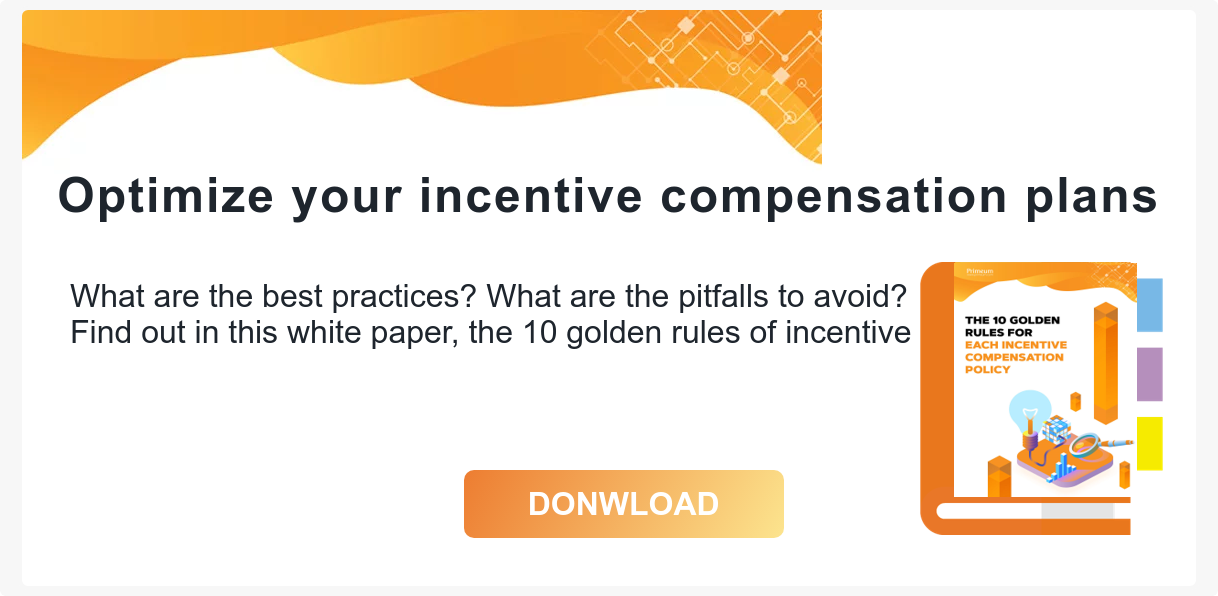While often decried or pushed down as a minor factor in the performance of commercial teams, salary (and especially variable salary) nevertheless remains the great particularity of the commercial sector. This is mainly because incentive compensation for sales team is around 30% on average, compared to 10% for other senior staff. So why isn’t your bonus scheme doing its job as a motivational tool? Can incentive compensation improve commercial performance?
To answer these questions, we need to look at the types of incentive plans on offer. In 2015, a study carried out by Uptoo found that 83% of sales force had achieved their bonus targets. The targets used in these plans are often poorly-set, capped, or collective, and in many cases end up being assimilated into the fixed salary. The risk here is creating an insider/outsider system when it comes to the few employees who do not receive their bonuses. In short, the bonus scheme is not flexible enough, and remains too blinkered to perform properly in French companies - especially SME.
HOWEVER, A COMPENSATION SCHEME IS THE MOST EFFECTIVE SOLUTION ACCORDING TO SALES FORCE THEMSELVES
Sales force are in no doubt: 60% of them consider salary to be a factor in their personal development.
Regardless of the level of bonus awarded to your employees, your compensation system must serve your business development strategy and be the driving force behind your sales force. Specialists generally say that fixed pay rewards job skills, while incentive rewards sales performance.
It’s true that a variable salary segment can motivate employees and open up a gap between stronger and weaker sales agents. This is being said, it’s important not to underestimate the motivational aspect of the employee’s fixed salary - this segment of their compensation helps maintain your commercial teams’ level of confidence, particularly during testing economic periods.
FINDING THE RIGHT RATIO OF FIXED/VARIABLE SALARY TO INCENTIVIZE YOUR TEAM
The art of attractive compensation lies in defining the proper breakdown between fixed and variable salary. If you aim for 60% of an employee’s salary to come from the variable portion, you’ll get results right off the bat. However, this option carries a significant risk of damaging client relations and the company’s long-term vision. Another risk is employee defection and high team turnover if the results are too difficult to obtain. Conversely, if your compensation system is 100% fixed salary, there’s no performance incentive at all. For these reasons, the usual ratio, for BtoB, is around 70 - 80% fixed salary and 20 - 30% variable pay.
CRITERIA FOR DEFINING THE RIGHT LEVEL OF INCENTIVE
Several criteria must be taken into account in order to successfully define the level of bonus to improve sales performance. First and foremost is supply and demand: if your sector is in good economic health, your sales force will be able to negotiate a higher fixed salary.
The length of your sales cycle is another factor. If the cycle is short, variable pay targets can be quickly achieved. This makes it easier to adopt a higher proportion of incentive - between 30 - 40% of total compensation. Conversely, over long performance cycles the proportion of fixed salary tends to be higher (usually above 80%). The remaining criteria will depend on your company objectives: do you want to focus on quantitative or qualitative objectives? Individual or collective targets? Short or long term?
SHOULD INCENTIVE BE CAPPED ?
Non-capped bonuses certainly have a motivational appeal to sales forces, as they mean there’s no limit to the results that can be obtained over a set period. For supporters of this approach, it’s a win-win in which the sales force’s performance can’t hurt the company’s margins. Those who favour capped bonuses respond that setting limits avoids creating huge disparities between the salaries of their sales team, and can soften the impact of exceptional events (both upturns and downturns). Neither system is right or wrong: the key is knowing how to sustain the motivational aspect of your compensation system, which must be viewed by team as fair and equitable - and above all, easy to understand.
ALREADY HAVE A COMPENSATION PLAN IN PLACE? SOLUTIONS TO HELP TAKE THINGS FURTHER AND IMPROVE YOUR COMMERCIAL PERFORMANCE
It can be useful to re-evaluate your compensation plan based on your sales results. Are you getting the results you hoped for ? Do you feel you’re underperforming? Are your targets always realistic given the conditions at hand? Have you modified your commercial strategy? Are you developing a new product or service package? Are you moving into a new market? A compensation plan will always require a few adjustments in order to remain coherent. The online simulation tool provided by comment-remunerer.com allows you to define your guiding lines for variable pay, find the solutions that are best adapted to your needs and stay within your budget.
Whatever the circumstances, a good bonus scheme is one that is clearly understood by your sales teams. That’s why it’s so important to communicate effectively regarding your variable pay schemes, showing your staff that you have carefully considered the various possibilities and, of course, allowing your sales teams to play a role in the decision. The next stage is driving your sales team to succeed via this variable pay scheme. Steering your teams’ commercial performance is often discussed in terms of incentives, but are you doing enough to motivate your teams through incentive compensation?
In order to take this aspect of your strategy to the next level and seek out an improved commercial performance, you can also consult the white paper on best practices for defining and administering a bonus scheme.





